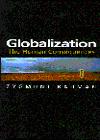revelation Community conferences ecology sociology scenarios populations settlements identity Communication architecture local development mobility land use social capital central places urban africa cities dottorati ricerca urban renewal conservation & preservation networks premio gubbio 2018 urbanization
Globalization
Zygmunt Bauman
The word "globalization" is used to convey the hope and determination of order-making on a worldwide scale. It is trumpeted as providing more mobility - of people, capital, and information - and as being equally beneficial for everyone. With recent technological developments - most notably the Internet - globalization seems to be the fate of the world. But no one seems to be in control. As noted sociologist Zygmunt Bauman shows in this detailed history of globalization, while human affairs now take place on a global scale, we are not able to direct events; we can only watch as boundaries, institutions, and loyalties shift in rapid and unpredictable ways. Who benefits from the new globalization? Are people in need assisted more quickly and efficiently? Or are the poor worse off than ever before? Will a globalized economy shift jobs away from traditional areas, destroying time-honored national industries? Who will enjoy access to jobs in the new hierarchy of mobility? From the way the global economy creates a class of absentee landlords to current prison designs for the criminalized underclass, Bauman dissects globalization in all its manifestations: its effects on the economy, politics, social structures, and even our perceptions of time and space. In a chilling analysis, Bauman argues that globalization divides as much as it unites, creating an ever-widening gulf between the haves and the have-nots. Rather than the hybrid culture we had hoped for, globalization is creating a more homogenous world. Drawing on the works of philosophers, social historians, architects, and theoreticians such as Michel Foucault, Claude Lévi-Strauss, Alfred J. Dunlap, and Le Corbusier, Globalization presents a historical overview of the methods employed to create and define human spaces and institutions, from rural villages to sprawling urban centers. Bauman shows how the advent of the computer translates into the decline of truly public space. And he explores the dimensions of a world in which - through new technologies - time is accelerated and space is compressed, revealing how we have arrived at our current state of global thinking. Bauman´s incisive methods of inquiry make Globalization an excellent antidote to the exuberance expressed by those who stand to benefit from the new pace and mobility of the modern life.
160 pages
CONTENTS
Introduction
1 Time and Class
Absentee landlords, mark
Freedom of movement and the self-constitution of societies
New speed, new polarization
2 Space Wars: a Career Report
The battle of the maps
From mapping space to the spatialization of maps
Agoraphobia and the renaissance of locality Is there life after Panopticon?
3 After the Nation-state--What? Universalizing--or being globalized?
The new expropriation: this time, of the state
The global hierarchy of mobility
4 Tourists and Vagabonds
Being a consumer in a consumer society
Divided we move
Moving through the world vs. the world moving by
For better or worse--united
5 Global Law, Local Orders
Factories of immobility
Prisons in the post-correction age
Safety: a tangible means to an elusive end
The out of order
Notes
Index




Planum
The Journal of Urbanism
ISSN 1723-0993
owned by
Istituto Nazionale di Urbanistica
published by
Planum Association
ISSN 1723-0993 | Registered at Court of Rome 4/12/2001, num. 514/2001
Web site realized by ChannelWeb & Planum Association | Powered by BEdita 3




